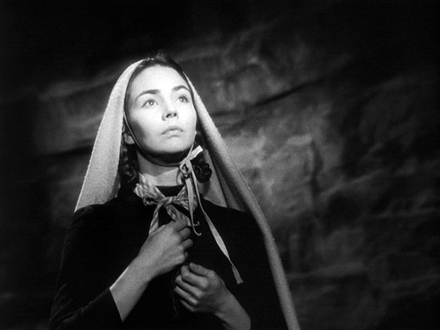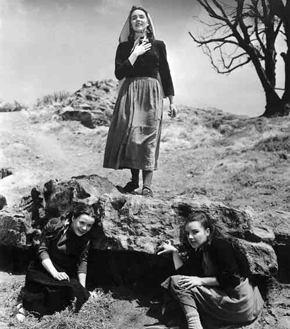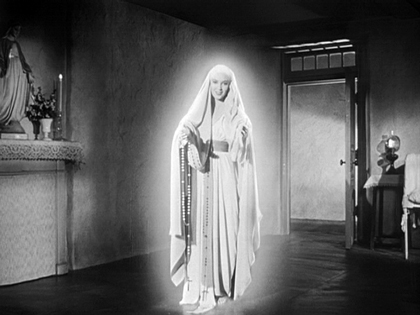
 |
|
|
|
The Song of Bernadette is one of 20th-Fox's more accomplished productions of the 1940s, a tasteful Hollywood treatment of a religious story. Its pious ad campaign bore taglines like, "The final fulfillment ... of everything you are ... or ever hope to be." The film we see is a rational, reasoned yet idealized argument for faith that may or may not have anything to do with the facts of what happened at Lourdes in 1858. It's also a moving emotional experience. This is an unimpeachably good production, with an intelligent script, fine direction and performances by actors that don't behave as if told to, 'hurry up and be enlightening.' It's a far cry from the fossilized reverence of something like The Greatest Story Ever Told. The casting of the radiant Jennifer Jones raises more questions of Hollywood aims and motives. She was not then a known face, yet she's compellingly beautiful: When is one glamorizing a subject? Would the audience care about the film's religious content, if its Bernadette weren't so beautiful & desirable? 
The B&W picture certainly doesn't try to beautify the past. Impoverished French girl Bernadette Soubirous (Jennifer Jones) sees a vision of a 'beautiful lady' in a cave at her town's dumping area. Her report makes it seem as if a miracle has occurred, and it snowballs into a major debacle for the state and the church. The local authorities harass Bernadette almost immediately: the venal mayor Lacade (Aubrey Mather), the abusive chief of police Jacomet (Charles Dingle) and the rational but harsh local prosecutor, Vital Dutour (Vincent Price). But Bernadette's sincerity and the lack of an ulterior motive finally win over the local Catholic Dean, (Charles Bickford), whose scorn melts into support. Bernadette passes several examinations by church authorities to determine if she's a fake, insane, or a genuine conduit to the divine. The Dean warns her that all three outcomes will probably have undesirable futures -- she'll end up in prison, an asylum, or the cloistered life. But Bernadette replies that 'the lady' told her she would have to suffer. There is no shortage of naïve and embarrassing films dealing with religion and faith, a fact that makes the achievement of The Song of Bernadette all the more impressive. We at first think that it will dodge the issue of faith, and instead zero in on the oppression of the poor, or the uncomprehending crudity of humanity when faced with a miracle. No, Bernadette's struggling family is neither crass nor noble, and the crowds that first surround the phenomenon at the grotto aren't presented as an inspired elite. George Seaton never showed this much un-diluted sincerity in his entire writing-directing career. His screenplay makes no bones about the circus that grows around Bernadette's miraculous spring, and charts fairly the simultaneous efforts to both suppress her visions and profit from them. The film even has the daring to present the Catholic Church, at least initially, as an authoritarian bureaucracy hostile to the miracle. The local Dean (Charles Bickford) wants to keep the rabble out of his garden. Both he and his higher-ups are primarily concerned with their personal political problems. What with civil and church authorities passing the buck, and harassing the young girl into a bureaucratic pit, for a few minutes The Song of Bernadette goes in the direction of a martyr's tale. Song of Bernadette is one of Vincent Price's best roles. In contrast to the selfish mayor and police chief, his skeptical prosecutor Vital is a man of principle who has chosen science and logic over faith and superstition. He's convinced that Bernadette's 'miracle' is just hysteria, a social sickness that needs to be discouraged. He tries every kind of nonviolent persuasion and intimidation to stop her, but never with malice. The movie is thoughtfully, wisely even-handed. No definite miracles are presented and the vision of the 'beautiful lady' -- never claimed by Bernadette to be the Virgin Mary -- is firmly established as something she alone sees. Except for one shot of the vision's feet, the Beautiful Lady always appears from Bernadette's isolated point of view. If one needs a rational "out", everything related to the miracle can be explained as coincidence -- the 'virgin' spring, and Bernadette's reportage of concepts she claims she knows nothing of, like The Immaculate Conception. If one wants to, there's little evidence to rule out the possibility that Bernadette is deluded, or perhaps faking the miracle outright. Of course, in movies one can't ignore a soundtrack that issues an unimpeachable heavenly choir during the miracle. And the special effect shot of the Beautiful Lady, glowing like a star, is an iconic image that can't be ignored -- it looks quite a bit like the 'miracle card' that the Dean hands out in the catechism class. 
The film therefore avoids a direct endorsement of Bernadette and her visions. It carefully positions the Vincent Price character to represent the rational alternative. The show doesn't commit itself until near the end, when Bernadette is for all intents and purposes canonized on film, with all her doubters and persecutors conquered. Price remains discouraged but skeptical until the film's only cheap scene, where he reveals that his previous atheism has made him lonely and miserable. Faced with death, he has a conversion at the grotto that throws the score solidly in God's favor. Is faith ultimately a question of human need and weakness? Yet The Song of Bernadette retains its dignity, more dignity than, say Schindler's List. Spielberg's picture seems all but flawless until its sudden eruption of sentimental slop just before its finish: "I could have saved more!" As it transcends the normal limits of honesty that can be reasonably expected from a 1943 Hollywood picture, this is still a triumph. I'm surprised the Catholic Church didn't come down on it for not showing their representatives as being virtuous and infallible from the start. It's a huge credit to Fox, and perhaps Darryl Zanuck, for not letting the picture sour into faith-kitsch, a Bells of St. Lourdes. One couldn't ask for more from Jennifer Jones, a remarkable actress from whose face emotions radiate like heavenly grace. She was in her twenties and had two children when she played Bernadette, and yet her convincing adolescent innocence can't be explained away by acting professionalism. Her mentor-lover David O. Selznick later placed her in one over-boiled romantic part after another, each of which she overcame with her incredible talent -- in a couple of scenes in Portrait of Jennie, she plays an even younger girl, and even more convincingly. At the time, audiences were convinced Jones was about 15 or so, which made it all the more puzzling when the debut of Bernadette was followed quickly by her divorce from Robert Walker and the breaking-up of the Selznick marriage. 1946 must have been a year of disillusion for moviegoers, what with Bernadette and the Dean of Lourdes (Jones and Bickford) playing fianc�és (briefly) in the grossly oversexed Duel in the Sun. Part of the popularity of that Western epic had to be the See-Bernadette-In-Heat factor. The beatific Beautiful Lady of Bernadette's vision was played by Zanuck's girlfriend Linda Darnell, who became the hot-to-trot Restoration floozy of Forever Amber. I'm not certain that Darnell's divine cameo was publicized at the time. The talent on display in small, well-integrated roles is impressive. Lee J. Cobb cruises in and out as a thoughtful doctor. Gladys Cooper (Now, Voyager, The Pirate) is terrific as a harsh nun jealous of the young novitiate. Earth-woman Anne Revere (Body and Soul) is Bernadette's strong mother and the weak Roman Bohnen (The Best Years of Our Lives) her father. King and Zanuck sure could pick 'em, bringing over the excellent Edith Barrett (The Ghost Ship) from RKO, for a tiny but impressive bit. All the casting is equally careful. 
Produced under the straitjacket of studio, church and censor oversight, religious movies are rarely as good as this one. Belief becomes a crippling problem in many well-intentioned Church-initiated projects, the kind that usually do too much proselytizing. Like it or not, movies about miracles play on the screen as fantasies, and when the makers insist the fantasies are 100% real, something gets lost in translation. The same thing happens at the other end of the spectrum when the more overtly fantastic The Exorcist goes too far by claiming to present a literal Truth with no leeway for interpretation. The Song of Bernadette saw and avoided that trap seventy years ago. Most movies today are so dumbed-down, its intelligent approach now seems inspired. Last note: Alfred Newman's quietly ecstatic music for Bernadette's visions holds long, tremulous notes that are almost painful in their wistfulness. They remind us of the eclectic John William's very similar music in the alien encounter section of Close Encounters of the Third Kind. Twilight Time's Blu-ray of The Song of Bernadette comes from a Fox HD master that looks good but has not undergone an extensive cleanup. Scratches and dirt are still present along with blemishes (watermarks) that one would think could be eliminated or digitally minimized with more effort. But other visual values are improvements on the now ten-year-old Fox Cinema Classics DVD. The edition includes an Isolated Score Track for Alfred Newman's music, widely considered to be one of the best scores of his lengthy career. It even skips the Fox fanfare for the logo. The movie can be played with or without an impressive Overture. With the improved audio of Blu-ray, this aspect of the film is also much improved. The main extra is a carryover from the old DVD, a feature-length (156 minutes) commentary with music specialist Jon Burlingame, Jennifer Jones biographer Edward Z. Epstein, and critic-author Donald Spoto. Burlingame's informative contributions are excellent, as usual. Mr. Epstein has a tendency to preach and over-dramatize with repetitive information and altogether too much of a sense of reverence. The film is an admirable, impressive emotional experience, but we're not quite ready to worship it. In all fairness, once the basic information and background on the movie is covered -- the private life of Ms. Jones is properly respected -- I wouldn't know how to keep talking for so long, without doing mini-biographies on every bit player who stepped onscreen. Holders of the old DVD might want to keep it so as not to lose its Biography episode on Jennifer Jones, and a brief but fascinating newsreel excerpt. It shows a nervous Jones delivering an awkward short speech and being hustled about by Milton Berle. But the new Blu-ray does have the original a theatrical trailer and a restoration comparison. Julie Kirgo's liner notes go right to the most interesting aspects of the production, offering cogent observations about the pitfalls of films about faith and probing the ironic Jones-Selznick-Robert Walker debacle. Kirgo even touches on the story of original author Franz Werfel. Fleeing Nazi persecution, he paused near Lourdes en route to America. Interestingly, we're made to realize that many of Hollywood's devout Christian epics were not made by practicing Christians. William Wyler is quoted as saying, "It takes a Jew to do this stuff well." Indeed!
On a scale of Excellent, Good, Fair, and Poor,
The Song of Bernadette Blu-ray rates:
Reviews on the Savant main site have additional credits information and are often updated and annotated with footnotes, reader input and graphics.
Review Staff | About DVD Talk | Newsletter Subscribe | Join DVD Talk Forum |
| ||||||||||||||||||